June 20, 2025 | 00:27 GMT +7
June 20, 2025 | 00:27 GMT +7
Hotline: 0913.378.918
June 20, 2025 | 00:27 GMT +7
Hotline: 0913.378.918
Farmers, cooperatives and businesses are the main actors in the process of implementing the transformation to green, low-emission agriculture in Vietnam in recent years. The Scheme "Sustainable development of 1 million ha specializing in high-quality rice cultivation associated with green growth in the Mekong Delta" is expected to change the rice industry in the Mekong Delta in particular, aiming towards the standards of green growth, food hygiene and safety, nutrition, and consumer tastes.
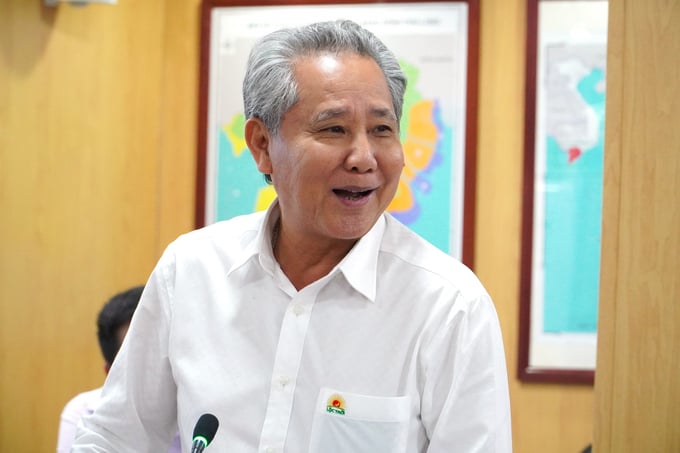
Mr. Huynh Van Thon, Chairman of Loc Troi Group. Photo: Kim Anh.
“Farmers are very enthusiastic when participating in the programs of eco-friendly and emissions-reducing rice cultivation. With the drastic decision of the Ministry of Agriculture and Rural Development, the project will quickly be realized, no longer the situation of leaving work unfinished. We need specific solutions to establish and organize the association of cooperatives since they are an important link to implementing the scheme. In 2024, Loc Troi will certainly deploy 100,000 ha of emissions reducing rice cultivation,” said Mr. Huynh Van Thon, Chairman of Loc Troi Group.
Sharing the same view, Mr. Pham Thai Binh, General Director of Trung An High-Tech Farming Joint Stock Company, said that Vietnam is the first country in the world to build emissions reducing rice farming models on a large scale.
Trung An High-Tech Farming JSC has pursued the “big paddy” model for more than 10 years and is continuing to develop it in the Mekong Delta provinces such as Hau Giang, Kien Giang, and Dong Thap. Following the success of the “big paddy” model, this enterprise is determined to develop cooperatives to expand the scale of the association.
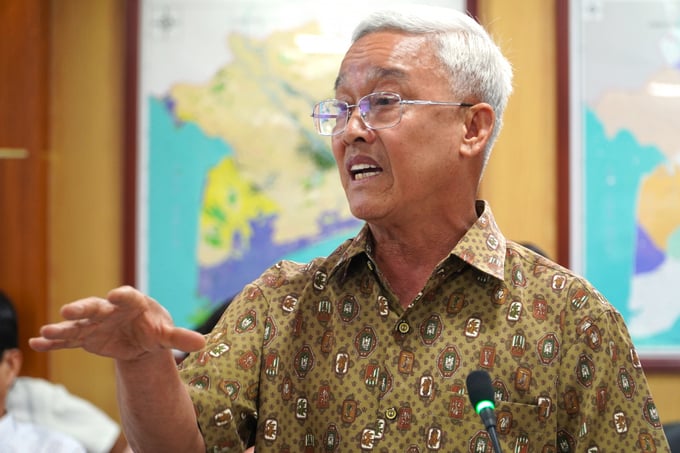
Mr. Pham Thai Binh, General Director of Trung An High-Tech Agriculture JSC. Photo: Van Vu.
Dr. Bui Ba Bong, former Deputy Minister of Agriculture and Rural Development, once posed the question about the relationship between high-quality rice growing areas in the Mekong Delta and other rice-producing regions in the country.
The Mekong Delta region is identified as a national key specialized rice production region. Developing rice production in the direction of high quality associated with green growth will create a widespread effect of core values for other rice production areas in Vietnam, thereby helping the country form a sustainable and long-term rice region for the future.
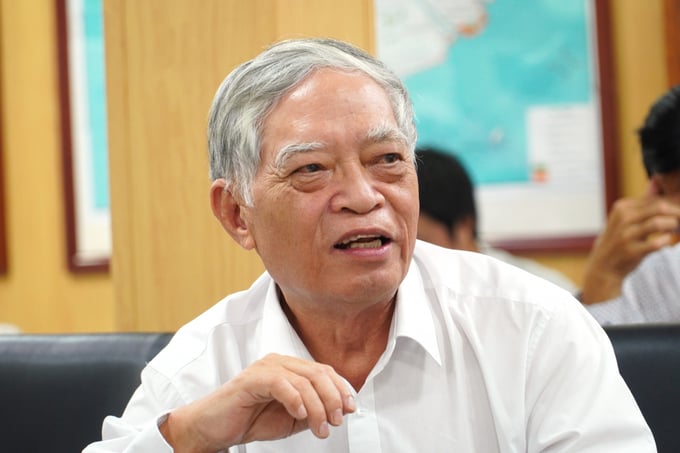
Dr. Bui Ba Bong, former Deputy Minister of Agriculture and Rural Development. Photo: Kim Anh.
In Dr. Bong’s view, the connection of farmers - cooperatives, businesses - cooperatives as well as other factors in the production chain is of utmost priority. “Without building linkages, we cannot create ‘big paddy’ models, leading to the inability to apply farming methods to reduce greenhouse gas emissions. We would also be unable to apply high technology, digitization and synchronous mechanization. If we do not do this task well, the next tasks will be even more difficult to implement”.
10 years ago In An Giang, the provincial agricultural sector cooperated with Loc Troi Group to pilot the construction of a pilot “big paddy” model. Now, the Mekong Delta, including An Giang, pays great attention to rice production associated with green growth, with a grand dream of creating a high-quality brand for Mekong Delta rice.
The province’s next step is to re-plan the fields to reduce costs, thus aiming to reduce greenhouse gas emissions in rice cultivation. Currently, the application of mechanization in An Giang province has reached 100% in some stages of harvesting, tillage, irrigation and drying.
According to Mr. Tran Anh Thu, Vice Chairman of An Giang People's Committee, the province's goal in the next period is to take farmers' income as a measurement. An Giang will promote guidance and support for farmers to apply sustainable and eco-friendly farming techniques to reduce costs by VND 500 - 1,000 per 1 kg of rice.
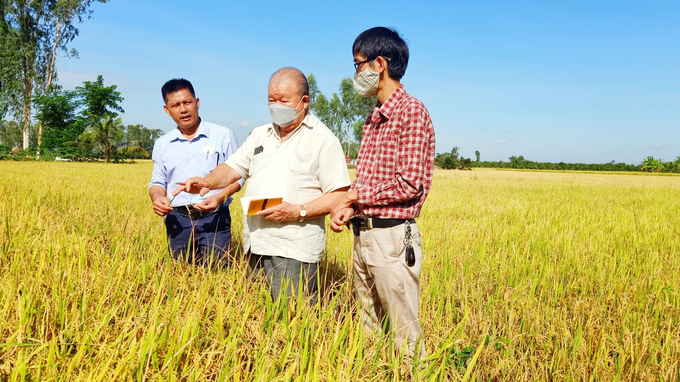
An Giang province wishes to create a brand for rice in the Mekong Delta through low-emission farming. Photo: Kim Anh.
In recent years, rice production in Hau Giang province has also experienced some major development. The structure of rice varieties in Hau Giang has changed significantly, gradually reducing low-quality groups such as IR50404 to high-quality rice varieties such as OM5451, OM18, Jasmin 85, Dai Thom 8, and ST24. High-quality rice varieties are now present in over 95% of Hau Giang’s total cultivated area, in line with market demands.
Mr. Dong Van Thanh, Chairman of Hau Giang People's Committee, said that in the face of climate change and high input costs, the province has built sustainable farming models following advanced and eco-friendly processes, contributing to improving the quality and value of rice. The locality has also formed many cooperative economic organizations, representing many farmers to implement legal and sustainable economic contracts.
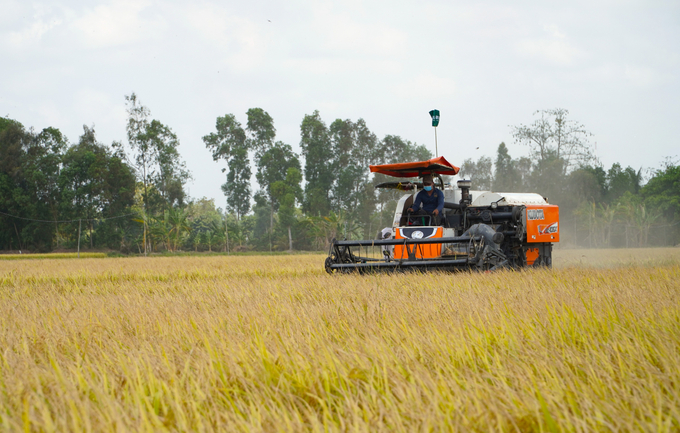
The VnSAT project has helped rice production in Hau Giang province reduce over 176,000 tons of CO2e. Photo: Kim Anh.
Particularly for the scheme of 1 million ha specializing in high-quality rice cultivation, Mr. Dong Van Thanh said that the local authorities not only aim at economic efficiency, creating high incomes for farmers but should also ensure the multi-target approach: adapt to climate change; reduce emissions caused by rice farming; contribute to transforming production thinking from improving quality, creating added value to sustainable development for provinces in the Mekong Delta.
The fourth Global Conference of the Sustainable Food Systems Programme is scheduled to be held from April 24 to 28 in Hanoi. The event receives attention from many ministers, deputy ministers, and heads of sectors from countries and international organizations.
The 4th global conference of the Sustainable Food Systems Programme will contribute to the 2023 Stocktaking Moment of the UN Food Systems Summit follow-up process by focusing on how food systems need to be transformed to overcome the multiple deeply rooted and interlinked crises of climate, biodiversity, conflict, energy, prices, hunger, malnutrition, and health to achieve the sustainable development goals (SDGs).
As the host country of the fourth conference, Vietnam will have the opportunity to share with other countries, United Nations organizations and international organizations about the efforts, results and the process of Vietnam's food system transformation.
The opening session is scheduled to be held on the morning of April 24, followed by thematic sessions. The SFS Program's closing meeting and the Multi-Stakeholder Advisory Committee (MAC) are scheduled to be held on the afternoon of April 27 and the morning of April 28.
For more information, please visit the links below:
https://www.oneplanetnetwork.org/programmes/sustainable-food-systems/4thconference
https://nongnghiepmoitruong.vn/hoi-nghi-toan-cau-he-thong-lttp-channel46/
Translated by Samuel Pham

(VAN) The waste of resources from agricultural by-products and the situation of counterfeit and poor quality goods in production causing losses of thousands of billions were pointed out by the National Assembly deputy.

(VAN) After 5 years of implementation, the CAI initiative has helped coffee growers change their farming practices, moving toward responsible agriculture that meets global export standards.

(VAN) The primary prerequisite for the comprehensive and robust integration of Vietnam's livestock sector into the global value chain is the establishment of a disease control system.

(VAN) The results of national programs are essential for establishing a contemporary livestock sector that is well-equipped to meet the demands of both domestic and international markets, with robust biosafety standards.

(VAN) The UNESCO Global Geopark revalidation of Non nuoc Cao Bang and the transition to a two-tier administrative model are presently undergoing a pivotal moment in Cao Bang, the northernmost province of Vietnam.
/2025/06/13/5330-2-004539_953.jpg)
(VAN) Changing policy mindset and removing investment barriers are urgent requirements to open up new development space for enterprises in the agricultural sector.

(VAN) The areas include the restoration of five million hectares of marine ecosystems.